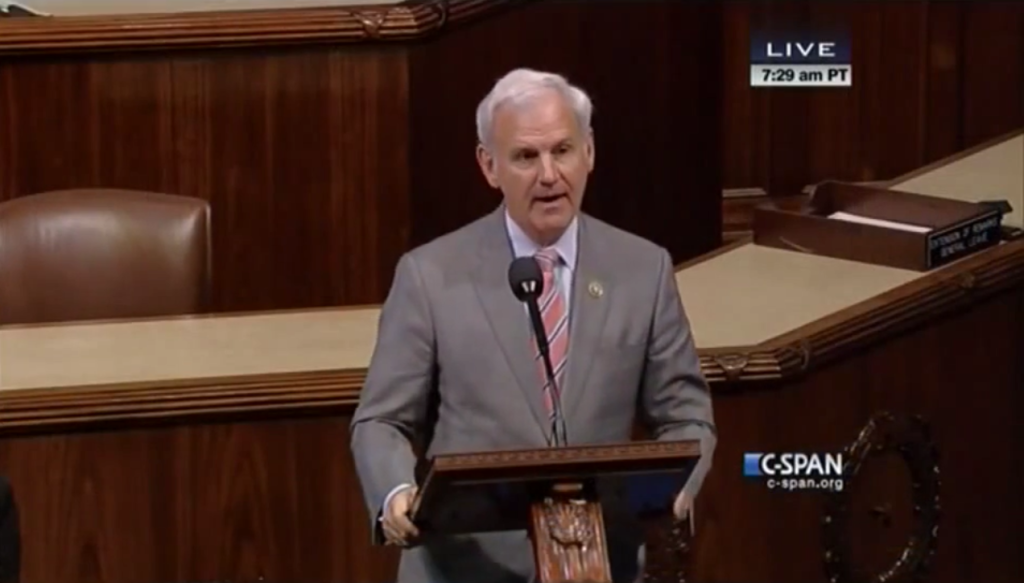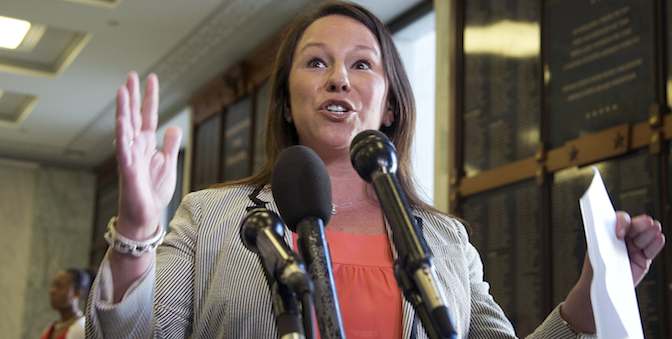Attalla column and milling plant to close, will affect 100 workers

A column manufacturing and milling company is planning to close its plant in Attalla. WBRC-TV reported Tuesday that Crown Column and Millwork issued a 60-day notice for its plant in Attalla to close. Plant spokesman Lance Servais says the closure was part of a strategy by the plant’s new owners. Servais says employees have been offered jobs at the company’s plant in Troy – roughly 190 miles south – and will be offered bonuses if they stay with the company for the 60 days until the facility closes. The closure is expected to impact about 100 workers. Attalla Mayor Larry Means says the job losses will cut the city’s occupational tax revenue, which is expected to have an impact on the city’s budget. Republished with permission of The Associated Press.
Court orders EPA to redo air-pollution limits in 13 states

A federal appeals court on Tuesday ordered the Environmental Protection Agency to relax some limits it set on smokestack emissions that cross state lines and taint downwind areas with air pollution from power plants. At the same time, the court upheld the EPA’s right to impose the clean-air standards, rejecting an argument by states and industry groups that the rule was overly burdensome. The ruling by the U.S. Court of Appeals for the District of Columbia Circuit orders the EPA to redo sulfur-dioxide and nitrogen-oxide standards for 13 states, mostly in the South and Midwest, that contribute to soot and smog along the East Coast. Texas and South Carolina would see limits for both forms of pollution adjusted, while new limits for either sulfur dioxide or nitrogen oxides would be set in 11 other states: Alabama, Florida, Georgia, Maryland, New Jersey, New York, North Carolina, Ohio, Pennsylvania, Virginia and West Virginia. The ruling follows a Supreme Court decision last year upholding the so-called Cross-State Air Pollution Rule, which blocks states from adding to air pollution in other states. The April 2014 ruling was an important victory for the Obama administration and capped a decades-long effort by the EPA to ensure that states are good neighbors and don’t contribute to pollution problems elsewhere. Industry groups and many of the affected states have cast the rule as an attempt to step on states’ rights and shut down aging coal-fired power plants as part of what many Republicans call a “war on coal” by the Obama administration. An EPA spokeswoman said the agency was pleased that the court decision keeps the Cross-State Air Pollution Rule in place “so that it continues to achieve important public health protections.” The EPA remains committed to working with states and power companies as it moves to implement the rule, spokeswoman Melissa Harrison said. “We are reviewing the decision and will determine any appropriate further course of action once our review is complete,” she said. The Supreme Court said the EPA, under the Clean Air Act, can implement federal plans in states that do not adequately control downwind pollution. But the court also ruled that the EPA can consider the cost of pollution controls and does not have to require states to reduce pollution by the precise amount they send to downwind states. The appeals court, in its ruling, said the EPA’s rule imposed overly strict limits on the 13 upwind states. As a practical matter, the limits would result in downwind states “overachieving” air quality standards for harmful pollutants, the court said. Frank O’Donnell, president of Clean Air Watch, an environmental advocacy group, scoffed at the idea that the EPA rule was overly strict. “The reality is we need more pollution control of power plants, not less,” he said, noting that the pollution standards used by the EPA were developed in the 1990s. “The targets involved in this case are so outmoded that they are almost irrelevant,” O’Donnell said. “We know in reality that these power plants are going to have to clean up even more to meet modern standards,” O’Donnell added, referring to new EPA rules on soot and smog expected in the next few months. The EPA also is expected to release a final rule as soon as next week on a historic plan to limit carbon pollution from coal-fired power plants. EPA Administrator Gina McCarthy has said the agency will be flexible and work with states on the first-ever controls on power plants for the gases blamed for global warming. Ross Eisenberg, vice president of the National Association of Manufacturers, called the court ruling a disappointment because it upholds the current regulation. “We are committed to clean air and water…but need balanced, achievable regulations that don’t leave manufacturers in constant regulatory limbo as the courts interpret overly aggressive policies,” he said. With the greenhouse gas and ozone regulations expected soon, “the need for that balance has never been greater,” he added. The EPA says the Cross-State Pollution Rule would cost power-plant operators about $800 million a year. Those investments would be far outweighed by the hundreds of billions of dollars in health-care savings from cleaner air, the agency said. The rule could prevent more than 30,000 premature deaths and hundreds of thousands of illnesses each year, the EPA said. Republished with permission of The Associated Press.
Email Insights: Bradley Byrne highlights federal spending crisis

U.S. Rep. Bradley Byrne took to the floor of the U.S. House of Representatives Tuesday to deliver a speech on how out-of-control federal spending is reaching crisis level and could result in a catastrophe for the next generation. In an email Tuesday afternoon, Byrne released the following video of his speech where he talked specifically about means based entitlement programs, including Medicaid, Obamacare, food stamps, among other welfare programs, noting spending within these programs has ballooned in recent years, despite improvements in the economy. We have reached a point where we must get serious about reining in our out-of-control spending or else we may fall victim to a similar fate that many nations throughout history have experienced. A full transcript of the video can be found below. Mr. Speaker, I rise this morning to talk about one of the biggest problems facing our nation – out-of-control spending. At this very moment the national debt sits at over $18 trillion dollars. We have not arrived at this point because of the actions of one party or one administration. Over the years, both parties have enacted programs that increased our debt. That said, we have reached a point where we must get serious about reining in our out-of-control spending or else we may fall victim to a similar fate that many nations throughout history have experienced. Here in the United States, our spending problems are reaching crisis level, and we are effectively leaving behind a catastrophe for the next generation. The basis of the American dream is that if you work hard, you can leave behind a better future for your children and grandchildren. That fundamentally American vision is in jeopardy due in part to our irresponsible spending. I am a new and very proud grandfather. My grandson, MacGuire, is about to turn one and already his share of the national debt – before his first birthday – is over $40,000. We cannot turn a blind eye to this problem and pretend that it will just get better. Let me explain why. There are two basic forms of federal spending: mandatory spending and discretionary spending. Mr. Speaker, when most people think of the federal government, they are probably thinking about discretionary programs. This is money that goes to things like our military, highways, national parks, agriculture, and medical research. The good thing about discretionary spending is that each year Congress has the ability to control these spending levels through the appropriations process. Since Republicans took control of the House in 2010, we have had some success in cutting funding to various federal agencies. For example, agencies like the IRS and EPA have seen their budgets cut in response to egregious executive overreach. While it may seem like it covers the majority of government operations, discretionary spending actually only makes up about one third of all federal spending. The other portion is what we call mandatory spending. This, along with the interest on the national debt, makes up almost two thirds of all federal spending. Now here’s the really bad part about mandatory spending: it is on auto-pilot. Unlike discretionary spending, mandatory spending does not require annual appropriations from Congress. Instead, as long as someone meets the requirements, these programs dole out money without any action from Congress. Within these mandatory spending programs are what we call means based entitlement programs, including things like Medicaid, Obamacare, food stamps, welfare, and the like. For example, in Fiscal Year 2012, the federal government spent almost $800 billion on over 92 programs aimed at lifting Americans out of poverty. Despite that record spending, too many Americans simply stopped looking for work. The system is failing the very people it was designed to help. While many of these means based entitlement programs have good intentions, they aren’t supposed to be permanent. These programs were created to help lift people out of poverty, not keep them there. That’s why it shouldn’t be a surprise that during the recent economic downturn spending on these means based entitlement programs ballooned. What is surprising however is that as the economy has improved, the spending on these programs has not gone down. In fact, spending on some of these programs remains at all-time highs. Now, Republicans and Democrats both agree that Americans shouldn’t be stuck in poverty, and that’s why we should put party politics aside and come together to address this dangerous cycle of government dependence. We need to reform these means based entitlement programs to put a real focus on workforce training to help connect Americans with the skills they need to get a good paying job that meets workforce demands. We could block grant, through the appropriations process, money to the state governments and allow them to craft poverty fighting programs based on their state’s specific societal problems and economic needs. Now, Mr. Speaker, I know that reforming these mandatory spending programs won’t be easy, but I didn’t run for Congress to come up here and make easy decisions. I doubt my colleagues did either. Before I leave this body, I want to be able to look at my grandson MacGuire and know that I have been a part of a real effort to rein in spending and put our nation on a fiscally stable path for the next generation. We won’t be able to make any real progress toward that goal without serious reforms to these means based entitlement programs. That is what is driving our debt, and we cannot keep looking the other way as the national debt skyrockets. So, Mr. Speaker, I call on my colleagues to join me in addressing our nation’s spending crisis. Let’s come together and make the tough choices, let’s get our spending under control, and let’s leave behind a better America for the next generation.”
Martha Roby, “tired of asking” for veteran care reform, calls for VA “takeover” of failing medical centers

On Tuesday, U.S. Rep. Martha Roby introduced a bill that would force the federal Veterans’ Administration to do something she has asked them to do for a long time: intervene when regional medical centers show they are unable to adequately care for American military veterans. Roby’s new proposal — H.R. 3234, dubbed the “Failing VA Medical Center Recovery Act” — calls for a “rapid response team of managers and medical professionals” to deploy to failing centers directly. “I believe the problem is we have been depending on a broken bureaucracy to fix itself,” said Roby in a prepared statement Monday. “I believe it’s time to change that by breaking through the bureaucracy to get results on behalf of our veterans.” “This is the ‘anti-bureaucracy.’ This is the team no complacent VA employee wants to see coming because they know that the status quo is about to get shaken up.” Roby represents Alabama’s 2nd Congressional District, where the state’s VA medical centers in Montgomery and Tuskegee have been identified as the nation’s worst and second worst, respectively. The third-term Republican said she will not allow inefficiencies in the “sprawling VA bureaucracy” that provides poor service to veterans stand any longer. “The determination of a failing medical center will be based on data, not the Secretary’s whim or what media attention it is garnering,” Roby said Monday. “My bill sets up an automatic trigger that compels the VA to act under the law. “I’m glad the [Veterans’ Affairs] Secretary [Robert McDonald] used his authority to take control of the situation in Phoenix. But, why not Montgomery? Why not Tuskegee? Why not come and take control of the worst and second worst situation in the country, especially after we have repeatedly asked and pleaded him to do so? “I’m tired of asking, and that’s why my bill requires the VA to step in and take charge.” See Roby’s House floor speech where she formally introduced the bill below.
Former Alabama officials accusing feds of education “takeover”

A group of former leaders within the Alabama Education Association, the state’s largest classroom teachers’ union group, penned a letter this month accusing its national counterpart, the National Education Association, with overstepping its authority after being brought in to clean up AEA’s financial affairs earlier this year. The AEA not-so-subtly hinted at legal action against the national group for reaching beyond its proper role as consultants and making moves moves that “encroach upon the powers of the AEA Board or Delegate Assembly.” The NEA stepped in after the state group’s expenditures outpaced its income last year, creating a deficit of about $8.5 million according to state tax records. The accounting problems, however, did not call for a more thoroughgoing personnel sweep of the kind NEA was proposing, read a July 2 signed by several AEA past presidents and board members. “Don’t force us to fight an organization we love, respect and support,” the missive said. “This is an ‘internal family issue,’ but the House is severely Divided. We all know that a House Divided cannot stand. It is going to take many years to repair the damage already done.” “If anyone thinks that an out-of-state stranger can do a better job for the AEA than its members, elected officers, constitutional administrative officers and the Board of Directors, he or she is sadly mistaken,” the letter continued. “The Trustee has no authority to hire, fire, promote or demote, restructure the AEA staff or encroach upon the powers of the AEA Board or Delegate Assembly.” The letter was dismissed, however, but the woman who currently sits atop the state education association, AEA president Sheila Hocutt Remington, called the letter “inaccurate” in a statement that accused past members of “clinging” to the ways of yesteryear. “AEA is successful because it has been a member-driven association for more than 150 years,” her prepared statement said. “While some people will always be uncomfortable with change and will cling to vestiges of the past, AEA and its membership is focused on what matters most – preparing students for a new school year that will begin throughout Alabama next week.” In an interview with the Montgomery Advertiser, former AEA Associate Executive Secretary Joe Reed, who signed the letter blasting the NEA, said there is nothing wrong with today’s AEA that cannot be fixed internally. “There’s nothing wrong with the structure,” Reed said. “There might have been errors made in some quarters, but the NEA audit picked that up and straightened that out, and kept it going.”
Study ranks Alabama school system No. 39 in nation

A new study put together by online financial services firm WalletHub ranks Alabama schools 39th in the country out of 51, according to its aggregated 2014-2015 data from various sources. The list puts AL schools just ahead of Mississippi, Idaho and New Mexico, and slightly behind Delaware, Hawaii and neighboring Georgia. Yellowhammer State schools were mostly given “C-” grades throughout the study’s methodology. For instance, the study rated Alabama 42nd in the nation on state spending on schools, which they said largely accounts for achievement gaps. Teacher-pupil ratios, average scores on the SAT and ACT college admissions tests, and the presence of local schools on the “Top 700 Best U.S. Schools” list were all according significant weight in measuring state school systems against one another. Massachusetts took home top honors at No. 1 in the nation, while Colorado, New Jersey, Wisconsin and Kentucky rounded out the top few. Louisiana, Arizona, Nevada, the District of Columbia and Alaska made up the bottom rungs of the national ladder according to WalletHub’s methodology. A recent post by Mississippi bloggers noted with surprise that the Magnolia State wasn’t pulling up the very rear in this year’s list: It shares a reputation along with other Deep South states as having low-performing schools on average. The new rankings come following another year of good news for Alabama’s voluntary pre-K system: A study listed it as the country’s best. Gov. Robert Bentley lauded that news but also noted that limited access to poor students prevents many from accessing them. The new study in full can be found here.
Hillary Clinton, Democratic hopefuls to address DNC members

The Democratic National Committee says all five of the party’s main presidential candidates will address DNC members next month. Former Rhode Island Gov. Lincoln Chafee, former Secretary of State Hillary Rodham Clinton, former Maryland Gov. Martin O’Malley, Vermont Sen. Bernie Sanders and former Virginia Sen. Jim Webb will speak at the DNC summer meeting in Minneapolis on Aug. 28. DNC chair Debbie Wasserman Schultz, a Florida congresswoman, says the DNC’s members will leave the meeting “inspired to redouble their efforts” to win the White House in 2016. The five major Democratic candidates spoke at a Democratic party fundraiser in Cedar Rapids, Iowa, earlier this month. Republished with permission of The Associated Press.


